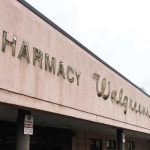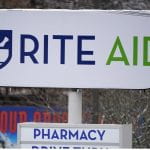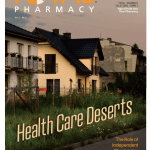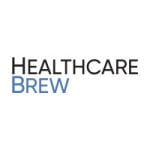This line of research examines how pharmacy access impacts individual’s ability to obtain and adhere to necessary medications as prescribed by their doctors. In addition, this area of research examines how pharmacy access and potential closures impacts health outcomes and disparities in those outcomes, given low-income and minority populations are disproportionately affected. Disparities in the use of prescription medications may be related to the fact that more members of minority groups live in “pharmacy deserts,” or low-access communities whose residents must travel farther to the nearest pharmacy to obtain their prescription medications. Thus, a large component of this research focuses on “pharmacy deserts” and closures that reduce individual’s access to medications and how this impacts health outcomes.
Insights:
Lack of easy access to prescription medications and other pharmacy-based services may contribute to health disparities. Explore these visualizations by PMPH staff, Andrew, to see how access to pharmacies across Los Angeles, Chicago, and Houston varied by their racial or ethnic composition. Jenny Guadamuz, Dima Qato, and their coauthors (2021) found that ‘pharmacy deserts’ disproportionately affect Black and Latino residents in many of the largest U.S cities. Read the publication in the Journal of the American Pharmacists Association here.
Select Publications:
Guadamuz, J. S., Alexander, G. C., Zenk, S. N., Kanter, G. P., Wilder, J.R., & Qato, D. M. (2021). Access to Pharmacies and Pharmacy Services in New York, Los Angeles, Chicago, and Houston, 2015-2020. Journal of the American Pharmacists Association, doi: 10.1016/j.japh.2021.07.009.
Guadamuz, J. S., Wilder, J. R., Mouslim, M. C., Zenk, S. N., Alexander, G. C., & Qato, D. M. (2021). Fewer Pharmacies In Black And Hispanic/Latino Neighborhoods Compared With White Or Diverse Neighborhoods, 2007–15. Health Affairs, 40(5), 802-811.
Qato, D. M., Alexander, G. C., & Lindau, S. T. (2021). Access To Birth Control At Community Pharmacies: The Authors Reply. Health Affairs, 40(1), 178-178.
Qato, D. M., & Zenk, S. (2020). Toolkit for a Community-Led Response to Pharmacy Closures in Chicago. clinicalscholarsnli. org TOOLKIT December 2020 Prepared by: Dima M. Qato. PharmD, MPH, PhD, University of Southern California Shannon Zenk, RN, PhD, University of Illinois at Chicago.
Guadamuz, J. S., Alexander, G. C., Zenk, S. N., & Qato, D. M. (2020). Assessment of pharmacy closures in the United States from 2009 through 2015. JAMA Internal Medicine, 180(1), 157-160.
Qato, D. M., Zenk, S., Wilder, J., Harrington, R., Gaskin, D., & Alexander, G. C. (2017). The availability of pharmacies in the United States: 2007–2015. PloS One, 12(8), e0183172.
Qato, D. M., Wilder, J., Zenk, S., Davis, A., Makelarski, J., & Lindau, S. T. (2017). Pharmacy accessibility and cost-related underuse of prescription medications in low-income Black and Hispanic urban communities. Journal of the American Pharmacists Association, 57(2), 162-169.
Qato, D. M., Daviglus, M. L., Wilder, J., Lee, T., Qato, D., & Lambert, B. (2014). ‘Pharmacy deserts’ are prevalent in Chicago’s predominantly minority communities, raising medication access concerns. Health Affairs, 33(11), 1958-1965.
Policy Impact:
Report to the White House Competition Council
Comprehensive Plan for Addressing High Drug Prices: President Biden’s Executive Order 14036, “Promoting Competition in the American Economy” (the Competition Executive Order), identifies a lack of competition as a key driver for problems across economic sectors. The Report presents principles for equitable drug pricing reform through competition, innovation, and transparency; describes promising legislative approaches; and summarizes actions already underway or under consideration across the Department of Health and Human Services (HHS).
House Bill 591 (ILLINOIS)
Ford Introduces Legislation for Greater Pharmacy Access: State Rep. La Shawn K. Ford, D-Chicago, has introduced legislation in the 102nd Illinois General Assembly to ensure greater access to pharmacy services for Illinois Medicaid recipients. Read House Bill 591 (Illinois) here.
White House Press Briefing by Press Secretary Jen Psaki, January 21, 2021
Increasing Access to Vaccines: The press briefing touched on the topic of increasing access to vaccines to people who are in pharmacy-desert areas, where they don’t have easy access to a pharmacy. Read a transcript of the press briefing here.
Public Act 100-0567 (ILLINOIS)
RE: Critical Access Pharmacies’ (CAP) Self-Attest Criteria: Per Public Act 100-0587 and recently adopted rules at 89 Ill. Admin. Code Section 140.439, HFS is required to make quarterly payments to Critical Access Pharmacies (CAPs). A CAP is defined as an Illinois-based brick and mortar pharmacy whose owners have an ownership or control interest in fewer than 10 pharmacies and is a) located in a county with fewer than 50,000 residents; or b) located in an area designated as a Medically Underserved Area by the Health Resources & Services Administration (HRSA). A brick and mortar pharmacy is defined as a pharmacy that is open to the public, where participants present at the pharmacy to fill prescriptions, and the majority of the pharmacy’s business is not mail-order based. Read Public Act 100-0567 (Illinois) here.
House Bill 1382 (INDIANA)
State Rep. Charlie Brown’s pharmacy desert study bill endorsed by Indiana House: House Bill 1382 urges the Legislature to study ways to eliminate pharmacy deserts across Indiana. Read House Bill 1382 here.
News Highlights:
 Here’s what CVS’s potential breakup could mean for you October 28, 2024
Here’s what CVS’s potential breakup could mean for you October 28, 2024- Why drugstores could be on the list of troubled business models October 28, 2024
 Walgreens’ closing triggers fears of ‘pharmacy desert’ February 14, 2024
Walgreens’ closing triggers fears of ‘pharmacy desert’ February 14, 2024 Pharmacy Deserts Put The Health of Undeserved Communities at Risk November 20, 2023
Pharmacy Deserts Put The Health of Undeserved Communities at Risk November 20, 2023- Drugstore closures could make pharmacy deserts even worse November 10, 2023
 Rite Aid’s bankruptcy plan stirs worries of new ‘pharmacy deserts’ October 17, 2023
Rite Aid’s bankruptcy plan stirs worries of new ‘pharmacy deserts’ October 17, 2023 Pharmacists Work to Sustain Care in Health Care Deserts October 3, 2023
Pharmacists Work to Sustain Care in Health Care Deserts October 3, 2023 Walmart to close four Chicago stores this weekend April 12, 2023
Walmart to close four Chicago stores this weekend April 12, 2023 Qato Awarded $1.65M NIH Grant March 27, 2023
Qato Awarded $1.65M NIH Grant March 27, 2023 How pharmacy deserts are formed March 20, 2023
How pharmacy deserts are formed March 20, 2023 High-tech map promotes access to medicine and pharmacy services November 2, 2022
High-tech map promotes access to medicine and pharmacy services November 2, 2022